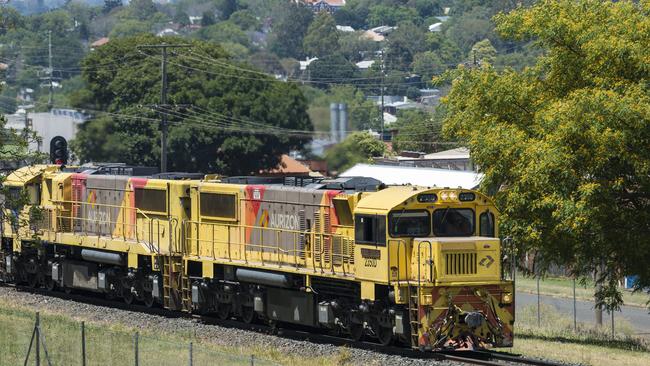Aurizon profit takes hit from China coal ban
RAIL giant Aurizon’s profit has taken a hit from China’s ban on Australian coal with the company forecasting the chilly relations could remain for an extended period.
Rail giant Aurizon’s profit has taken a hit from China’s ban on Australian coal, with the company forecasting the chilly trade relations could remain for an extended period.
Brisbane-based Aurizon, which connects more than 50 coal mines to ports on the east coast of Australia, announced a 22 per cent decline in half-yearly profit to $267m. Revenue fell 2 per cent to $1.498b.
The result was impacted by the sale of Aurizon’s rail grinding business in the year earlier period with profit declining 1 per cent on an underlying basis.
Aurizon managing director Andrew Harding said he was confident in the long-term demand for Australian coal, but China’s decision to restrict imports meant new markets would have to be found. Aurizon railed 102 million tonnes of coal in Queensland and NSW in the first half compared to 106 million tonnes in the previous period.
“Australian coal suppliers to China are moving to other markets around the world,” said Mr Harding. “While they have not been 100 per cent successful, this will become less of an issue.

“This is a Chinese government decision and whether there will be a change of mind is difficult to determine. But if the Chinese continue to accept less or zero Australian coal, our coal will fill a void in other markets. This is likely to stay this way for a long time.”
Aurizon cut its full-year guidance for coal shipments to between 200-210 million tonnes from an earlier estimate of 210mt to 220mt.
Australia’s total coal exports declined 79 per cent in the December quarter with 53 vessels holding Australia coal remaining off the coast of China.
Aurizon shares have slumped 27 per cent in the past year on concern Chinese trade tensions and the move away from coal to renewables would hit revenue. The shares rose 3.9 per cent to $4 Monday as investors were buoyed by growth in other areas of the business, including shipments of other mining commodities.
Mr Harding said the company has seen growth in its bulk business as it tapped into growth commodities such as fertilisers, chemicals, iron ore and nickel.
Moody’s vice president John Manning said that although Aurizon had performed strongly in the bulk business, the decline in coal earnings foreshadowed longer-term headwinds.
Mr Manning said Aurizon faced increasing challenges around environmental issues, including investor appetite for coal-exposed assets and technological advancements that displace coal. “Revenue pressures are likely to persist throughout 2021 as Aurizon faces lower export coal volumes,” said Mr Manning. “This reflects a challenging operating environment, mainly characterised by continued Chinese trade restrictions on the import of Australian coal.”
Lower coal volumes also were impacted by COVID-19 and various maintenance and production issues facing mining companies.

Mr Harding said despite the focus on a low-carbon future, Aurizon expected to see continued coal export growth of 1 per cent over the next decade, supported by demand for steel in India and a relatively young fleet of coal-generation power plants in Asia. Global steel production has now returned to pre-COVID-19 levels including record productions levels in China.
“Australian coal is in demand because of its quality and its proximity to markets in South-East Asia,” he said. “The market for coal in Asia is totally different to Australia where we have a low-growth energy market with old coal-fired power stations.”
By contrast countries in Asia, including Vietnam and India, were facing rising demand for coal to make steel for infrastructure and to fuel coal-fired power stations that had an average age of 13 years as opposed to 35 years in Australia.
Despite the challenging trading environment with China, Aurizon lifted its interim dividend payout 5 per cent to 14.4c a share.
Aurizon last year purchased two businesses — ship loading services provider ConPorts in Newcastle and Townsville Bulk Storage and Handling — as it expanded bulk operations.
Aurizon is seeking to grow businesses such as bulk after exiting the intermodal container business. The company sold its Queensland intermodal business to Linfox including freight terminals at Rockhampton, Mackay, Townsville, Cairns, Emerald and Longreach in 2019.


